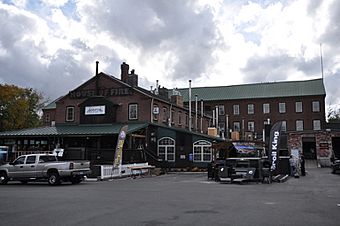- This page was last modified on 17 October 2025, at 10:18. Suggest an edit.
Pultz & Walkley Company facts for kids
|
Pultz & Walkley Company
|
|
|
U.S. Historic district
Contributing property |
|
 |
|
| Location | 120 W. Main St., Southington, Connecticut |
|---|---|
| Area | 1.5 acres (0.61 ha) |
| Built | 1880 |
| Architectural style | Industrial vernacular |
| Part of | Plantsville Historic District (ID88002673) |
| MPS | Historic Industrial Complexes of Southington TR |
| NRHP reference No. | 88002677 |
| Significant dates | |
| Added to NRHP | December 8, 1988 |
| Designated CP | December 1, 1988 |
The Pultz & Walkley Company was an important factory in Plantsville, Connecticut, a village within Southington, Connecticut. It was also known later as The Five Star Company. This historic group of buildings is located at 120 West Main Street. The company started in the 1870s and was famous for making many paper bags. This factory is one of the best-preserved old industrial places in Southington. It was added to the National Register of Historic Places in 1988 because of its history.
What is the Pultz & Walkley Company?
The Pultz & Walkley factory is on the south side of the Plantsville village. Its main buildings are tall brick structures. They are 2 and 3 stories high. The buildings are shaped like a "T" when seen from above. The top part of the "T" faces West Main Street.
These buildings show a common style from the late 1800s. They have windows with rounded tops. The brickwork near the roof has special patterns. Smaller buildings were added to the main structure over time.
How did the Pultz & Walkley Company start?
The Pultz & Walkley Company began in 1870. It was started by L.V. Walkley and J.P. Pultz. They invented special machines to make paper bags. The main building you see today was likely built around 1875. It was made even bigger in 1898.
This factory was very busy. In 1899, it produced 3 million paper bags! The front of the building, facing the street, is still in great shape. It reminds us of Southington's past as a busy industrial town.


